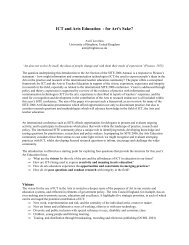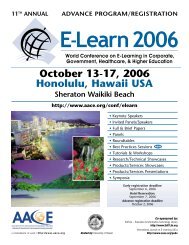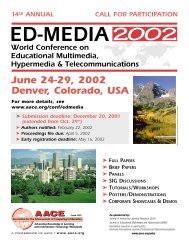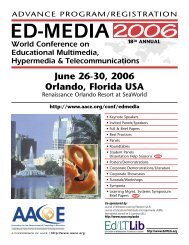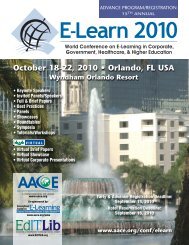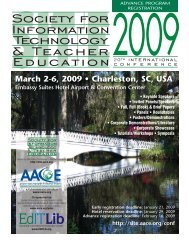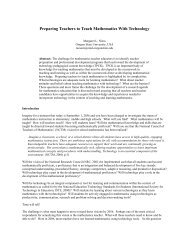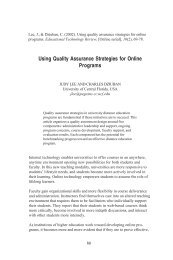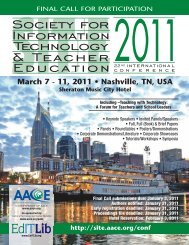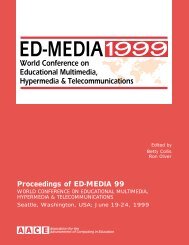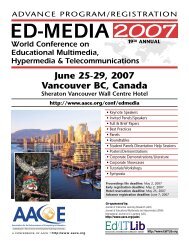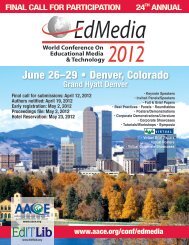ED-MEDIA 1999 Proceedings Book - Association for the ...
ED-MEDIA 1999 Proceedings Book - Association for the ...
ED-MEDIA 1999 Proceedings Book - Association for the ...
Create successful ePaper yourself
Turn your PDF publications into a flip-book with our unique Google optimized e-Paper software.
In this study, we propose <strong>the</strong> following two points which were found through analysis of crossage<br />
tutoring. First we propose that learners’ questions and <strong>the</strong> tutors’ responses are representative of <strong>the</strong>ir<br />
metacognitive experience. Second we propose in <strong>the</strong> process of cross-age tutoring that tutors cause <strong>the</strong><br />
learners’ metacognitive experience to progress.<br />
Section 2 describes <strong>the</strong> cross-age tutoring practices and representative dialogs. Section 3<br />
illustrates <strong>the</strong> relationship between learners' questions and tutors’ suggestions and <strong>the</strong>ir metacognitive<br />
experience. Section 4 delineates <strong>the</strong> process of <strong>the</strong> cross-age tutoring that tutors cause <strong>the</strong> learners’<br />
metacognitive experience to progress.<br />
Cross-age tutoring practice and dialog<br />
First, let us make a distinction between collaboration and cooperation. We cite <strong>the</strong> following<br />
definition by Roschelle and Teasley (Roschelle & Teasley, 1994).<br />
“Collaboration is a coordinated, synchronous activity that is <strong>the</strong> result of a continued attempt to<br />
construct and maintain a shared conception of a problem. Cooperation is accomplished by <strong>the</strong> division<br />
of labor among participants, as an activity where each person is responsible <strong>for</strong> a portion of <strong>the</strong> problem<br />
solving.”<br />
We designed a cross-age tutoring situation <strong>for</strong> use on a computer network between <strong>the</strong><br />
Department of Engineering and <strong>the</strong> Department of Art at Tamagawa University. The 6 senior students<br />
in <strong>the</strong> Department of Engineering tutored <strong>the</strong> 34 first year students in <strong>the</strong> Department of Art. The first<br />
year students had no particular level of computer literacy.<br />
Two tasks were assigned. The first task was to learn new terms that are encountered in<br />
computer science. As examples:<br />
1. RAM: random access memory,<br />
2. ROM, read only memory, and so on.<br />
The second task was <strong>for</strong> <strong>the</strong> first year students to create Web Pages to explain <strong>the</strong>ir interpretation of <strong>the</strong><br />
terms encountered in computer science. Requesting this explanation of terms allowed <strong>the</strong> students to<br />
engage in fur<strong>the</strong>ring constructive knowledge.<br />
This "class" term was <strong>for</strong> six weeks. In <strong>the</strong> first task, most students did not understand <strong>the</strong> terms<br />
encountered. Additionally most students were unable to explain <strong>the</strong> terms as assigned in <strong>the</strong> second task.<br />
They required fur<strong>the</strong>r help from senior students in <strong>the</strong> Department of Engineering using Bulletin Board<br />
Services [BBS]. Senior students tutored <strong>the</strong>m through <strong>the</strong> BBS. By using <strong>the</strong> BBS <strong>for</strong> <strong>the</strong>ir<br />
communications all students were able to have access to all questions and suggestions. The tutors were not<br />
given any specific instructions about how to do <strong>the</strong>ir teaching. They were only told to help <strong>the</strong> first year<br />
students.<br />
The content of <strong>the</strong> interactions was recorded on <strong>the</strong> BBS. Following we will show some examples of<br />
natural discourse indicating how knowledge was constructed in cross-age tutoring.<br />
Questions that request in<strong>for</strong>mation<br />
All university students asked questions that request in<strong>for</strong>mation such as “What is a modem” in<br />
<strong>the</strong> first lesson.<br />
Question 1:<br />
Although we have researched SCSI, we do not understand it. Please explain it to us simply.<br />
Question 2:<br />
Hi, it is hot today. How are you doing I have researched about floppy disks. However, I have little<br />
knowledge. Please help me. Please explain about floppy disks in words that I can understand.<br />
Question 3:<br />
Let us know about CD-ROMs in simple terms.



